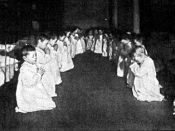Maternal deprivation
Bowlby was a psychoanalyst; he came up with a theory for maternal deprivation. He used this theory to explain how a child would be effected if the emotional bond between the care giver and the infant was broken.
He also showed that if the attachment was damaged on a regular basis, the child could suffer with social, intellectual and emotional damage due to maternal deprivation.
This view is supported by Bowlby's research, 44 Juvenile Thieves. Bowlby conducted a piece of research in which to find out if children were deprived of their mother during the critical period of attachment of the first few years of their lives, could this lead to a serious range of permanent consequences happen for later development.
He took 88 clients from the child guidance clinic. Forty-four children had been referred to the clinic because of stealing. Bowlby interviewed children and their parents building up a record of their early life experiences.
Bowlby found that 32% of the 'thieves' showed affectionless psychopathy as they had spent a considerable amount of time in hospital of a foster home as infants. In contrast only a small amount on the non-affectionless thieves had the same experiences. He concluded that disruption during the attachment stages was responsible for this.
However this research was argued by Michael Rutter, he suggested that Bowlby did not consider the differences between deprivation and privation and their different consequences. He also stated that Bowlby over simplified maternal deprivation.
Another piece of evidence done by Schaffer and Emerson also contradicts Bowlby's work, because it shows that individual attachments only started to happen after 8 months and that other attachments could be made after this period.
Rutter also said that the components are different to Bowlby's and that the children with...


